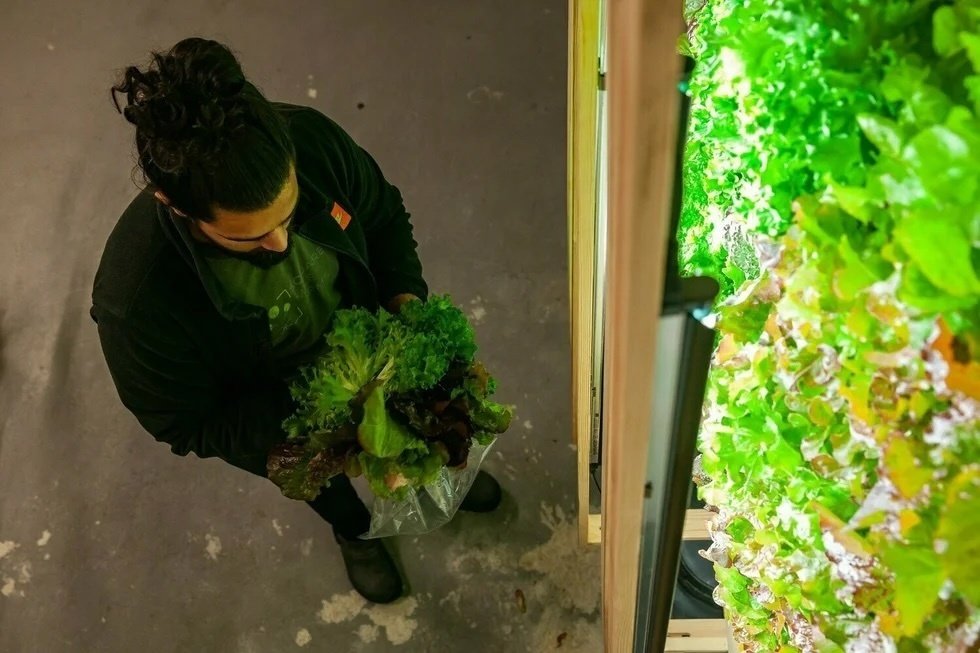Sowing seeds for a greener future: Key skills for landing a green job
18. 3. 2024
5 min.


Journalist
A green job doesn’t necessarily mean a job on the front lines of sustainability and climate protection. In fact, green jobs can be found across many industries—but they often require the same skills, values, and vision. There’s no doubt sustainability holds a more important place than ever in our lives, and with that, green jobs are playing an increasingly important role in society.
As demand for green workers continues to rise, the job market is actually understaturated with workers who have green skills. A 2023 study from LinkedIn found that only one in eight workers had some kind of green skill—hardly enough to meet the increasing demand across industries. Alongside the reward of knowing that the work you do is beneficial to the environment, the same study found that workers with green skills are also 29% more likely to be hired than those without, and also have an advantage during times of economic uncertainty.
There are many ways we can all make more sustainable lifestyle choices, and working in a green job is one of the most effective ways to contribute to a greener world. If you want to make a positive impact on the environment through your work, finding a green job might be the next step for you. So, what skills should you highlight—and build—to land a green job? Let’s take a look.
What are green jobs?
Before diving into the skills you’ll need to land a green job, let’s look at what a green job actually is. In short, green jobs are careers or roles that contribute to the preservation or restoration of the environment. If you have a green job, it means that either directly or indirectly, the work you do has a positive impact on the natural world. From wildlife biology to engineering and environmental law or politics, green jobs run the gamut in terms of skills and qualifications required. While many fields can have green jobs, the majority fall under the following categories:
- Energy: The energy sector is an integral part of the American economy. The way we obtain and use energy dictates the way we live our lives, and altering the way we fuel our society is one of the biggest ways we can be more sustainable. Working for a company that creates or invests in renewable energy is one of the best ways to contribute to a greener future.
- Environment: Environmental careers are essential to preserving the natural world. As well as working directly with the environment, workers in this field can educate and inform other industries on how to be more sustainable. Whether you are working as an ecologist or a park ranger, almost any job in an environmental field will be green.
- Agriculture: The food we eat and how we grow it is one of the biggest factors contributing to climate change. Finding more innovative ways to grow crops, raise livestock, and manage our resources is critical to reducing the human impact on our environment.
- Transportation: Responsible for nearly one-quarter of carbon emissions, the transportation industry will play a key role in converting to green energy, and combating climate change.
- Finance: Money makes the world go round, and it’s no different when it comes to green jobs. If you really want to make an impact, finance is one of the best ways to invest in the environment. Interestingly, finance is actually one of the industries with the most growth around green jobs, increasing its green workforce by nearly 15% year over year.
What green skills should you highlight on your resume?
With such a wide range of careers and industries centered around the future of green jobs, it can be hard to know what skills will help you the most in your job hunt. Aside from the required qualifications for any job you may be applying for, recruiters are also looking for skills and values that align with the grander vision of sustainability initiatives. Even though green jobs exist in many different fields with a variety of different backgrounds and abilities required, there are a few universal skills that will help you stand out from the competition.
Hard skills
- Technical ability: Many of the green jobs out there are not office jobs. When you think about sustainable professions you may think of researchers or lawyers, but in fact, skilled laborers are the key to building newer, greener infrastructure. From installing solar panels to assembling electric vehicles, technical skills in electricity, construction, irrigation and more can allow you to make a direct impact on the environment.
- Scientific background: While there are many different career paths and fields that can lead you to a green job, it’s no surprise that the majority of them require a scientific background. Having a basic understanding of the science that is used to study and combat climate change will be an essential skill, no matter what kind of work you will be doing.
- Data analysis: Whether you want to work in ecology, consultancy, finance, or law, many green jobs will require the ability to understand and analyze data. Of course, the type of data and its purpose will vary across industries, but no matter if it’s reading scientific reports, looking at emission trends, studying wildlife populations, or tracking the stock market, having a good head for numbers, will take you far.
Soft skills
- Leadership: In any industry, leadership is a valuable skill to have. No matter your level, demonstrating your capacity to guide those around you and contribute to a team effort will make you stand out.
- Communication: While this may seem like a necessary skill for any job, being able to communicate efficiently and effectively is especially important for green jobs. The ability to communicate on environmental issues that can often be complex or difficult to understand will be very valuable when it comes to working with clients or consumers who are not familiar with the scientific nature of many green industries.
- Adaptability: Our understanding of sustainability is constantly evolving, and so are green industries. Being able to quickly adapt to new technologies, environmental regulations, or new research will be an essential skill when it comes to succeeding in a green job.
- Conviction: Your desire to work in a green job may be due to your personal beliefs and values about humanity’s relationship with the environment—values that most green workers share. In order to show that you would be a cultural fit for a job in the green industry, it will help you to be able to demonstrate your ethical convictions around the topic of sustainability. If your work experience doesn’t show a previous commitment to sustainable industries, you can use volunteer experience, education, or a cover letter to illustrate how you appreciate and practice sustainability in your personal and professional life.
Key takeaways: Green skills for green jobs
The journey into green careers is not just about making a living—it’s about making a difference. Here are the key takeaways from our exploration of the skills and paths that lead to meaningful employment in the realm of sustainability:
- Green jobs span a wide range of industries, from energy and environment to agriculture, transportation, and finance, each playing a pivotal role in advancing sustainability.
- A significant skills gap exists, with only one in eight workers currently possessing green skills despite rising demand, highlighting the opportunities for those willing to develop these competencies.
- Hard skills such as technical ability, scientific knowledge, and data analysis are fundamental across various green jobs, whether it’s installing solar panels, engaging in environmental research, or assessing sustainable investment opportunities.
- Soft skills like leadership, communication, and adaptability are equally crucial, enabling professionals to guide teams, articulate complex environmental issues, and adjust to the fast-evolving sustainability landscape.
- Conviction and commitment to sustainability are powerful differentiators in the job market, often shared among green workers. Demonstrating this commitment through actions, education, or volunteering can significantly enhance your job prospects.
- The pursuit of a green job is an investment in the future—not just of your career but of the planet. It’s a path marked by continuous learning, adaptability, and the unyielding belief in a better, sustainable world.
Embarking on a green career is both a personal choice and a global imperative. As we look toward the future, the need for skilled, passionate individuals in green jobs will only grow. Whether you’re stepping into the workforce for the first time or pivoting towards a more meaningful career, the journey toward sustainability starts with you.
Photo: Welcome to the Jungle
Follow Welcome to the Jungle on Facebook, LinkedIn, and Instagram, and subscribe to our newsletter to get our latest articles every week!

Viac inšpirácie: Hľadanie práce

Family first: What working parents should look for in potential employers
Are you a working parent struggling to balance career and family? Here’s how to find the perfect company for your needs.
17. 4. 2024

Can you keep up with AI? Here are 3 skills job hunters need today
How can you enhance your career in the age of AI? These skills that technology can't replace are key …
15. 4. 2024

Want a remote job? Here are the top 10 fully remote roles hiring right now
Explore the most in-demand fully remote jobs of 2024.
11. 4. 2024

Wanderlust with a conscience: Ethical considerations for digital nomads
The thought of working remotely from Hawaii, Mexico, or Portugal is tempting, but is it worth it? Ask yourself these questions first ...
02. 4. 2024

5 signs you're ready to change careers
Ever feel like you’re just not the right fit for your current career? These 5 indicators may help you decide if now is the time to make a change.
25. 3. 2024
Novinky, ktoré to vyriešia
Chcete držať krok s najnovšími článkami? Dvakrát týždenne môžete do svojej poštovej schránky dostávať zaujímavé príbehy, ponuky na práce a ďalšie tipy.

Hľadáte svoju ďalšiu pracovnú príležitosť?
Viac ako 200 000 kandidátov našlo prácu s Welcome to the Jungle
Preskúmať pracovné miesta